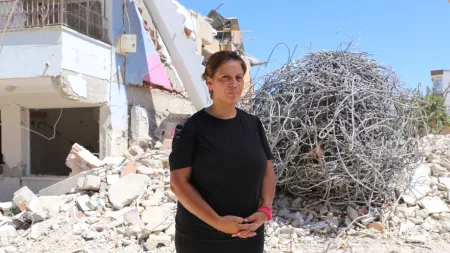Gaziantep, August 2, 2023 – This Sunday, August 6, marks six months since a series of earthquakes struck vast swathes of southern Türkiye and northwest Syria. Families in the affected areas are struggling to rebuild their lives while having to cope with record-high temperatures that are further stretching limited water resources.
“Six months on, people in Türkiye are still suffering the consequences of the catastrophic earthquakes,” said Sherine Ibrahim, Director of CARE Türkiye. “They have lost relatives, friends, and neighbors, and for many, entire livelihoods. Those most severely affected still have little or no access to resources and services and therefore very limited capacity to self-recover.”
The massive earthquake that struck on February 6, with its epicenter close to the southern city of Gaziantep, left at least 50,000 dead and 100,000 injured in Türkiye, with another 3 million internally displaced and almost 300,000 buildings completely destroyed. A total of 9.1 million people were affected throughout the country’s southeast region.
Across the border in northwest Syria, where millions have already lived in precarious conditions following 12 years of conflict, the earthquakes added a crisis on top of existing crises. More than 4,500 people died and 10,400 were injured. There was widespread damage to buildings, including schools, clinics and protection spaces for women and girls. An estimated one million children continue to be out of school.
"Whether in northwest Syria or in southern Türkiye, humanitarian needs are immense and will continue being so for years,"says CARE Türkiye's director.
“This is a triple scourge for the people of northwest Syria,” said Ms Ibrahim. “Humanitarian needs were already at a record high when the earthquakes struck. The Security Council’s failure to reauthorize UN cross-border aid into the region has placed further anxiety and uncertainty on families living there. Finally, while the region is suffering from water scarcity, one of the worst heatwaves in recent years, with temperatures of over 40 degrees celsius, puts lives at risk with a large number of fires reported in July that damaged homes and tents. We are particularly concerned for the women and children who have lost the security of their homes and are being exposed to increased vulnerabilities.”
In Syria’s northwest, additional concerns include hunger—with over 3 million people estimated to be food insecure—and the lack of clean water. There are over 100,000 suspected cholera cases since the beginning of the outbreak in the region and dehydration is another serious risk, particularly for malnourished women and children. Water shortages are also a concern in the earthquake-affected areas of Türkiye, where the lack of adequate toilet and shower facilities in the newly established camp sites poses significant risks, especially for women.
“Six months after the earthquakes and with additional funding for the survivors of the earthquakes in both Türkiye and northwest Syria looking unlikely, we are extremely worried that solutions to relieve people’s suffering are still not adequate. It is our duty to remind governments and donors that the impact of the earthquakes and the long-term socioeconomic risks associated with it require immediate attention,” said Ms Ibrahim. “It is also critical that the Security Council brings back a cross-border resolution that is functional and allows UN and NGO-led operations to deliver humanitarian aid at scale to the people of northwest Syria.”
"It is of the utmost importance that the humanitarian response does not fade,"Sherine Ibrahim says.
For media inquires please contact Iolanda Jaquemet, CI Secretariat Senior Humanitarian Communications Coordinator, via: [email protected]
Notes to editors:
-
CARE spokespeople are available for interviews.
-
In Türkiye, CARE has so far reached 65,000 individuals with shelter, water, hygiene and sanitation services, food, cash for food, and protection services, including psychological first aid.
-
In northwest Syria, CARE and its partners have reached more than 675,000 people through shelter, food, water, sanitation and hygiene activities, as well as health and protection support.
